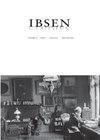“Spidsborgere i Blæst” – Henrik Ibsen’s De unges Forbund and the Crisis of the Radical Political Imaginary
IF 0.1
0 THEATER
引用次数: 0
Abstract
The comedy De unges Forbund (1869; The League of Youth) was one of Ibsen’s greatest successes on the Scandinavian and especially the Norwegian stages during his lifetime. It is the first prose-play by Ibsen in which he deals with problems of his present age. Moreover, he uses the depiction of actual political controversies and problematic economic transactions in a Norwegian provincial town in order to outline a general crisis of the modern age. These three observations alone make it quite astonishing that the existing research on the play is relatively small. In this article, I will read De unges Forbund in the light of current discussions in German literary studies that have been inspired by Cornelius Castoriadis’ theory of the political imaginary. I think that the play deals with a crisis of the political sphere in the midst of the nineteenth century that can be traced back to a new form of hollow and populistic rhetoric and empty theatrical rituals. In order to reconstruct the corresponding political and historical-philosophical implications of the play, I will also discuss writings of Karl Marx and Søren Kierkegaard. I will combine this re-contextualization of the play with three central theses. As already mentioned, I think that Ibsen uses the comedy in order to outline a more general reflection on the historicity or “zeitgeist” of his own age. This attempt is characterized by striking contemporary observations on the effects of a populist vision of an imagined community and the corresponding power of media. Moreover, I think that the play deals more generally with the crisis of politics and history“Spidsborgere i Blæst”——易卜生的《外滩与激进政治想象的危机》
喜剧《De unges Forbund》(1869年;《青年联盟》)是易卜生一生中在斯堪的纳维亚,尤其是挪威舞台上最成功的作品之一。这是易卜生第一部处理当代问题的散文剧。此外,他还描绘了挪威一个省镇的实际政治争议和有问题的经济交易,以勾勒出现代的普遍危机。仅凭这三个观察,就足以让人感到惊讶的是,现有对该剧的研究相对较少。在这篇文章中,我将根据德国文学研究中当前的讨论来阅读德昂格斯·福本德,这些讨论受到了科尼利厄斯·卡斯托里亚迪斯政治想象理论的启发。我认为这部剧处理的是19世纪中期的政治领域危机,可以追溯到一种新形式的空洞民粹主义言论和空洞的戏剧仪式。为了重构该剧相应的政治和历史哲学意蕴,我还将讨论卡尔·马克思和瑟伦·克尔凯郭尔的著作。我将把这部剧的重新语境化与三个中心论点结合起来。如前所述,我认为易卜生使用喜剧是为了对他自己时代的历史性或“时代精神”进行更全面的反思。这一尝试的特点是对想象中的社区的民粹主义愿景和相应的媒体力量的影响进行了引人注目的当代观察。此外,我认为这部剧更普遍地涉及政治和历史的危机
本文章由计算机程序翻译,如有差异,请以英文原文为准。
求助全文
约1分钟内获得全文
求助全文

 求助内容:
求助内容: 应助结果提醒方式:
应助结果提醒方式:


